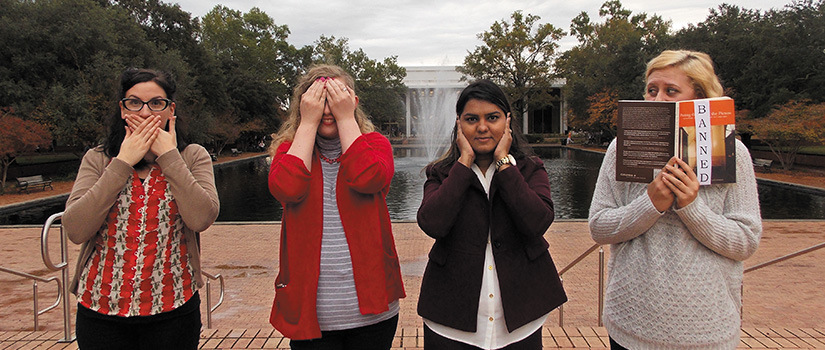Posted on December 15, 2015
Story by Brooke Hesano, Reprinted from InterCom
Photo: Library and Information Science Student Association Officers Amanda Bullington, Megan
Coker, Mir Parvin and Ashley Ware pose in front of Thomas Cooper Library.
For nearly as long as books have been bound, the words within them and the ideas they provoke have been challenged. “It really speaks a lot about different cultures and periods of time, what some people consider inappropriate, unhealthy and unsuitable to not just read, but have access to,” says Lindsay Rogillio, president of the Library and Information Science Student Association (LISSA). LISSA students, passionate about our freedom to read, posed as characters from their favorite challenged books for the 2015 edition of LISSA’s calendar.
“We really outdid ourselves,” Rogillo said in reference to the “Scandal in the Stacks” display during 2014’s Banned Books Week that inspired this year’s ‘dark force of censorship’ calendar theme. The calendar features former LISSA president Taylor Atkinson as Alice from Lewis Carroll’s Alice in Wonderland and current president Rogillio as The Awakening’s Edna Pontellier standing in front of Thomas Cooper library.
The “Scandal in the Stacks” exhibit and the banned books-themed calendar were two significant projects that helped LISSA win the New Members Round Table and American Library Association’s (ALA) 2015 Student Chapter of the Year (SCOTY) Award. In order to be named Student Chapter of the Year, the student organization must contribute to the university community, involve its members, and exemplify outstanding leadership through those activities. This is LISSA’s second time winning the SCOTY award; the first was in 2008.
Banned Books Week is an annual event observed by the ALA and celebrated nationally. Through displays featuring challenged books and a variety of events, Banned Books Week aims to educate communities that censorship is still a very serious problem, even in the United States.
The First Amendment is so important to the College of Information and Communications that it’s etched into the glass balcony of the new journalism building. Being able to read, write and say what we choose is something that many Americans take for granted, which is why it is important to be conscious of these freedoms.
Students of Professor Jay Bender's media law class know the importance of the U.S. Constitution’s First Amendment guarantees. “When a government bans the distribution or assignment of a book it is signaling to its citizens that the government is entitled to make choices about what citizens are allowed to think,” says Bender. “Of course this is wholly inconsistent with the notion of democracy and the guarantee of the First Amendment. And, it always seems that the smallest minds are most fearful of citizens who think.”
With all the opportunities to remember what has been challenged in the past, it’s frightening to consider what might be challenged in the future. By bringing attention to the dangers of censorship, we can collectively protect our First Amendment guarantees. Imagine becoming an adult without ever knowing Holden from Catcher in the Rye, Pip of Great Expectations or Harry Potter himself.
Brooke Hesano is a senior public relations major.
